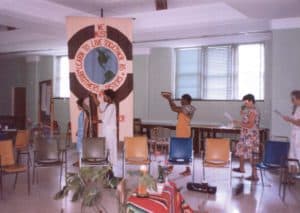
- About
-
-
Love, mercy, justice
The Sisters of Providence of Saint Mary-of-the-Woods are a community of vowed Catholic women religious. Inspired by our foundress Saint Mother Theodore Guerin, we are passionate about our lives of prayer, education, service and advocacy.
-
-
- Justice
-
-
Break boundaries, create hope
Spirituality and justice go hand-in-hand. We are committed to walking with those on the margins. Join us on our journey to make Earth better for all.
-
-
- Be inspired
-
-
What inspires you?
We all need a little spiritual inspiration sometimes. Let the wisdom of our Providence Community support you on your journey.
-
-
- Visit
-
-
Experience the Woods
From the moment you step onto the grounds at Saint Mary-of-the-Woods, you know you're somewhere special. There's something for everyone at the Woods.
-
-
- Get involved
-
-
Where do you fit in?
Reconnect or find new opportunities with the Providence Community. Volunteer in one of our many ministries, be an intern on the farm, explore job opportunities or reminisce about your alma mater.
-
-
- Join
-
-
Join the Providence Family
Live joyfully! Single, Catholic women ages 18-42 are invited to explore a fulfilling life as a Sister of Providence. All women and men of faith are invited to join the family of Providence as Providence Associates.
-
-
- Prayer Requests
- Contact us
- Donate

Looking racism in the eye: there is still much to do

I believe that racism is one of the greatest evils of our time. Allow me to reflect on a few examples of racism I experienced in the Louisville, Kentucky, area while growing up.
Once I was not seated in a local restaurant because I was with a black friend of mine. I worked in a hospital with signs reading “colored,” segregating bathrooms and dining rooms. One of the aides in the hospital wanted to become a nurse and was not accepted because of her ethnicity. She later achieved a master’s degree in nursing from the Sisters of Charity School in Louisville.
My home town was a small city that did not permit African-Americans within the city limits after dark. The deed to our house did not allow us to sell our house to anyone of African-American descent.
Fighting back

lead an anti-racism think tank at Saint
Mary-of-the-Woods. The Providence
community has a long history of working
to combat racism.
I also had some encounters with racism since entering the Sisters of Providence Congregation.
In 1996, the Sisters of Providence sued a landlord in Chicago for housing discrimination. Two white Sisters of Providence had lived in an apartment on the northwest side of Chicago for three years. One sister transferred ministry and moved out. Another sister, who happened to be African-American, moved in. Within a week the management told the sisters they needed to move, saying a relative needed the apartment. When they left, the apartment was put back on the market and an unrelated white woman moved in.
The Congregation won the lawsuit and used the $40,000 we received from it to educate against racism. We trained an anti-racism team which helped develop programs for racism awareness within our community, our staff members, schools and even the local police department.
History and future
The Sisters of Providence have a long history of working to overcome our own racism and of ministering to diverse communities. Over the years, the Sisters of Providence have ministered in African-American communities in Indiana, Illinois, Mississippi, Alabama and North Carolina (where the local bishop later asked us to leave the area due to our not wearing the habit.)
As we move into the next five years, we acknowledge that there is still much to do in ourselves and in our world. We look forward to bringing anti-racism efforts to the forefront in our justice activities.
Originally published in the winter 2022 issue of HOPE magazine.





